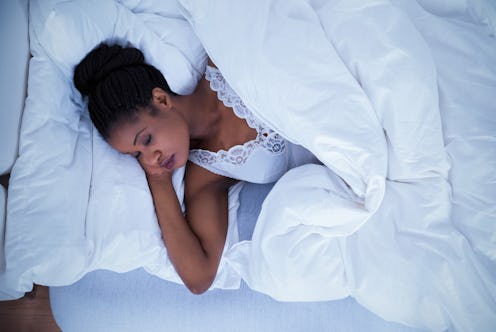Life
Here’s How To Get A Better Sleep Routine In 3 Days

Sleep can be amazing — particularly if you've been pulling all-nighters lately — but if you're experiencing some problems with getting shut-eye lately, you may need to get a better sleep routine. There are many potential reasons that your sleep may be disturbed or non-existent, experts tell Bustle, and many of them start with how you wind down at night.
"There are physiologic factors involved, such as presence of sleep apnea, restless leg syndrome, circadian rhythm disorders, and others," Dr. Vernon Williams, MD, a sports neurologist and founder of the Center for Sports Neurology and Pain Medicine at Cedars-Sinai Kerlan-Jobe Institute in Los Angeles, tells Bustle. "There are work-related factors, such as early morning and overnight shifts, work-related travel, and jet-lag, and there are environmental factors, which individuals can adjust to improve their sleep efficiency." Whether you're experiencing the side effects of some significant change in your life, or are trying to sleep in an environment that isn't conducive to deep rest, you can improve your sleep routine — in as little as three days.
Sleep isn't just for returning your energy. "Sleep is a critical time for overall body healing, regulation, and restoration," Dr. Williams tells Bustle. "Disordered sleep can affect blood pressure, heart rate, mental status, hormonal and immunological function, as well as a host of other critical aspects of our normal physiology." Sleep problems aren't something to be pushed under the rug — so here's how to quickly improve your sleep routine.
1Analyze Your Current Sleep Issues
Dr. Williams recommends checking out your current sleep issues to see what exactly is going wrong, and how it's affecting your sleep. "Are you able to fall asleep within 15-20 minutes of lying down? Do you regularly sleep for a total of seven to nine hours during any given 24-hour time period? Is your sleep continuous (not characterized by periods of waking)? Do you wake up feeling well-rested? When you are awake, do you feel alert and productive throughout most of the day?" he says. "If you answered yes to these questions, then you’re likely on the right track. If you answered no, then it’s essential to get to the bottom of why your sleep health isn’t all it should be and begin fixing it." It may be worth wearing a sleep tracker or keeping a sleep diary to note how your sleep changes over the course of several days.
2Get Rid Of Electronics
One of the main ways to improve your sleep quickly, says Dr. Williams, is to improve something called sleep hygiene, otherwise known as the lifestyle factors surrounding your sleep and waking. A major contributor to poor sleep hygiene, and a quick fix if you're fixing your sleep routine, is electronics. "Get rid of bedroom distractions: smartphones, tablets, televisions and other bright light sources that can disrupt your brain’s sleep signals," Dr. Williams tells Bustle. "Making a commitment to eliminating them from your sleep space can be a massive help to the overall quality of your sleep." Along with the removal of distractions, turning off electronics also eliminates blue light, which is known to keep people awake.
3Get More Sunlight
A very swift way to help your sleep routine is to add sunshine. "Get enough exposure to sunlight during the day, especially during the early morning hours if possible," advises Dr. Williams. "This has to do with your brain’s sleep-wake clock and is a frequently overlooked factor in getting better sleep since our society is spending less and less time outside these days." Our brain has an internal circadian rhythm that dictates when we sleep and wake, and exposure to sunlight can make it more wakeful during the day and sleepier at night.
4Find Ways To Relax Before Bed
The things you do directly before bed form the most important part of your sleep routine. Make it a calming time free of distractions to give yourself the best chance of sleep. "Finding ways to help your brain unwind before bed and throughout the day is crucial," says Dr. Williams. "Mindfulness meditation, light yoga or taking a warm bath can all help." Avoid caffeine and stressful activities to avoid lying awake thinking endlessly until late at night.
5Get Medical Advice
Medical conditions may also be obstructing your sleep, and that could mean all the sleep hygiene in the world can't help. "If you feel like you’ve tried the above and still aren’t getting the quality shut-eye you need, talk to your doctor about it," Dr. Williams tells Bustle. "There may be a medically-related sleep disorder that needs to be addressed."
One possibility, Dr. Avram Gold, MD, of the Division of Pulmonary, Critical Care, and Sleep Medicine at Stonybrook Medicine, tells Bustle, is a kind of undiagnosed sleep apnea. "I define obstructive sleep apnea syndrome as any fluttering of the throat during sleep (snoring or inaudible) together with poor sleep," he tells Bustle. "Lean women of all ages tend to be in this category of obstructive sleep apnea." However, there are many conditions that may cause sleep issues, so if your sleep routine isn't showing any signs of improvement, it's a good idea to talk to a medical professional.
6
A few quick fixes can help improve your sleep routine pretty quickly, and help you see if there are underlying causes that may be creating issues. "There's plenty you can do to improve your sleep hygiene if your sleep habits aren’t up to snuff," says Dr. Williams. It's time to lie down and enjoy those ZZZs.
This article was originally published on